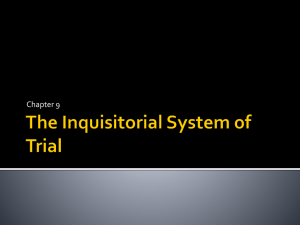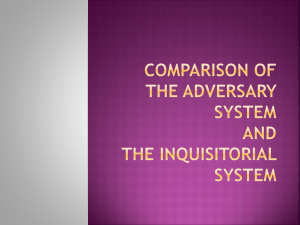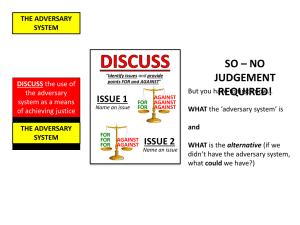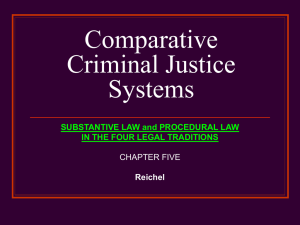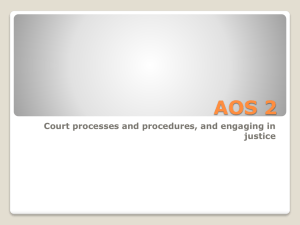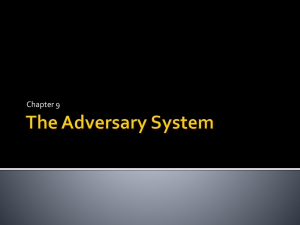Booklet 1.2
advertisement
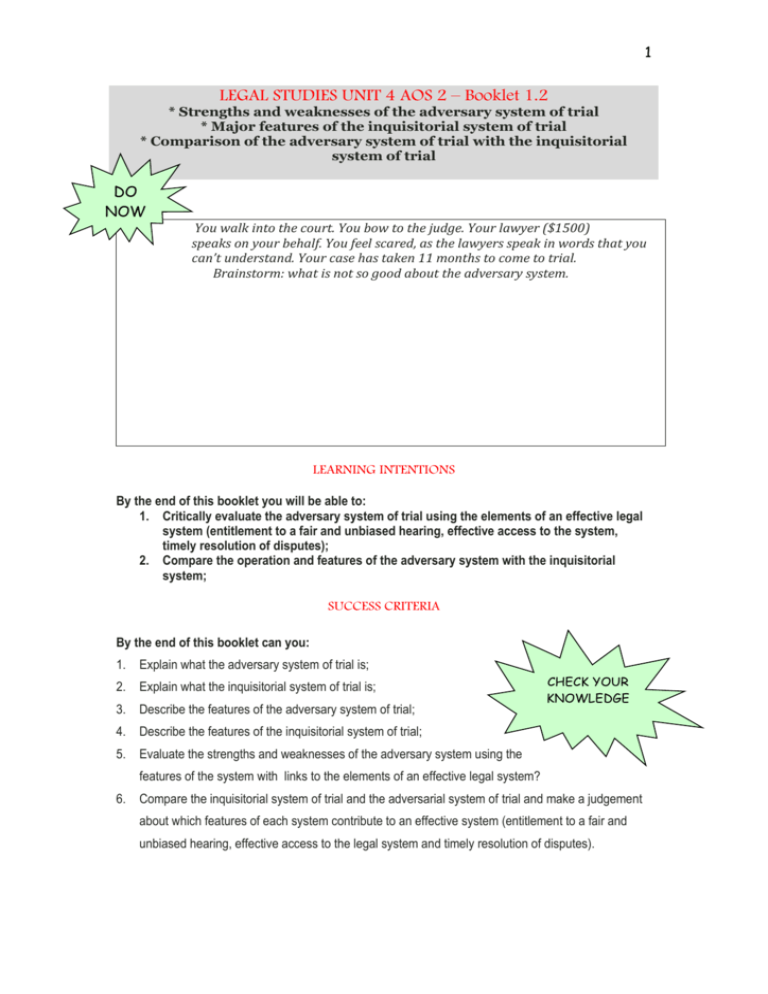
1 LEGAL STUDIES UNIT 4 AOS 2 – Booklet 1.2 * Strengths and weaknesses of the adversary system of trial * Major features of the inquisitorial system of trial * Comparison of the adversary system of trial with the inquisitorial system of trial DO NOW ````` You walk into the court. You bow to the judge. Your lawyer ($1500) speaks on your behalf. You feel scared, as the lawyers speak in words that you can’t understand. Your case has taken 11 months to come to trial. Brainstorm: what is not so good about the adversary system. LEARNING INTENTIONS By the end of this booklet you will be able to: 1. Critically evaluate the adversary system of trial using the elements of an effective legal system (entitlement to a fair and unbiased hearing, effective access to the system, timely resolution of disputes); 2. Compare the operation and features of the adversary system with the inquisitorial system; SUCCESS CRITERIA By the end of this booklet can you: 1. Explain what the adversary system of trial is; 2. Explain what the inquisitorial system of trial is; 3. Describe the features of the adversary system of trial; CHECK YOUR KNOWLEDGE 4. Describe the features of the inquisitorial system of trial; 5. Evaluate the strengths and weaknesses of the adversary system using the features of the system with links to the elements of an effective legal system? 6. Compare the inquisitorial system of trial and the adversarial system of trial and make a judgement about which features of each system contribute to an effective system (entitlement to a fair and unbiased hearing, effective access to the legal system and timely resolution of disputes). 2 Strengths of the adversary system of trial Define what is meant by the adversary system of trial: Complete the table below, describing the major strengths and weaknesses of the adversarial system of trial. USE THE ELEMENTS OF AN EFFECTIVE LEGAL SYSTEM TO EVALUATE THE STRENGTHS OF THE ADVERSARY SYSTEM OF TRIAL. FEATURE OF THE ADVERSARY SYSTEM (The Tomato Stood Tall Today) Role of the parties The role of the judge Strengths Relates to… CRITERIA….. 1. Entitlement to a fair and unbiased hearing? 2. Effective access to the legal system? 3. Timely resolution of disputes? 3 Burden of proof and standard of proof Rules of evidence and procedure Need for legal representation Weaknesses of the adversary system of trial 4 FEATURE OF THE ADVERSARY SYSTEM (The Tomato Stood Tall Today) Role of the parties The role of the judge Burden of proof and standard of proof Weaknesses Relates to… CRITERIA….. 1. Entitlement to a fair and unbiased hearing? 2. effective access to the legal system? 3. Timely resolution of disputes? 5 Rules of evidence Rules of procedure Need for legal representation See page 345 for a summary table of the strengths and weaknesses of the adversary system of trial…. Turn it into your own mind map! Strengths and weaknesses of the adversary system of trial Explain the role of the judge in the adversary system. To what extent does the judge or magistrate enhance the effective operation of the legal system? 6 How can the rules of evidence and procedure be a strength and weakness of the adversary system of trial? Discuss three features of the adversary system of trial that aim to provide a fair and unbiased hearing. In your discussion, explain whether you think these features are successful in contributing to a fair and unbiased hearing or whether these features limit the achievement of a fair and unbiased hearing (10 marks). STOP: Use the ‘evaluate question’ template to plan your answer! 7 Major features of the inquisitorial system of trial So, we have analysed the features of the adversary system of trial and evaluated the effectiveness of the adversary system of trial. In order to be able to fully evaluate the effectiveness of the adversary system we need to know what other systems exist. Now it is time to learn about the major features of the inquisitorial system of trial. Define what is meant by the inquisitorial system of trial: 8 The role of the parties In the inquisitorial system, the judge has most of the control over the case. As such, the parties…… Therefore the role of the parties in the inquisitorial system is said to be…….. The role of the judge In the inquisitorial system the judge takes a more ACTIVE ROLE IN THE CASE. This includes: What is the justification for an inquisitorial system? Burden of proof and standard of proof Is there a burden of proof and standard of proof in an inquisitorial trial? Rules of evidence and procedure Explain the use of rules of evidence and procedure in the inquisitorial system, noting the contrasts to the rules of evidence and procedure used in the adversary system. 9 The role of legal representatives Explain the role of legal representatives in the inquisitorial system. Which features of the inquisitorial system do you think would help the adversarial system of trial in reaching a fair outcome? Discuss. Comparison of the adversary and inquisitorial systems of trial Read page 351 – a HIGH SCORING response. Write an extended response that outlines the similarities and differences between the adversary and inquisitorial systems of trial. 10 Use the ‘SUMMARY OF COMPARISON BETWEEN THE INQUISITORIAL AND ADVERSARY SYSTEMS OF TRIAL’ on pg 352-353 to complete a set of Cornell notes to SHOW that you know!

